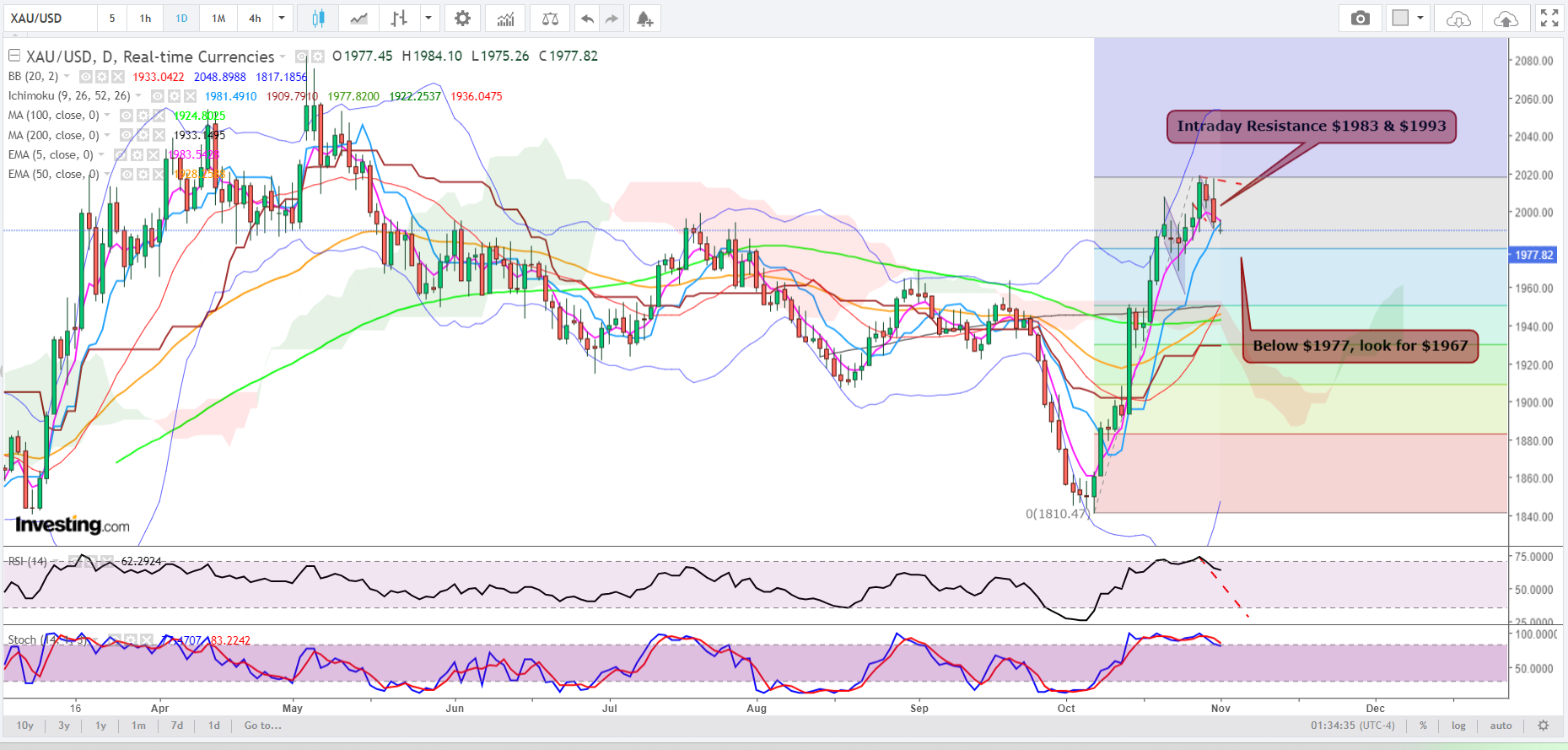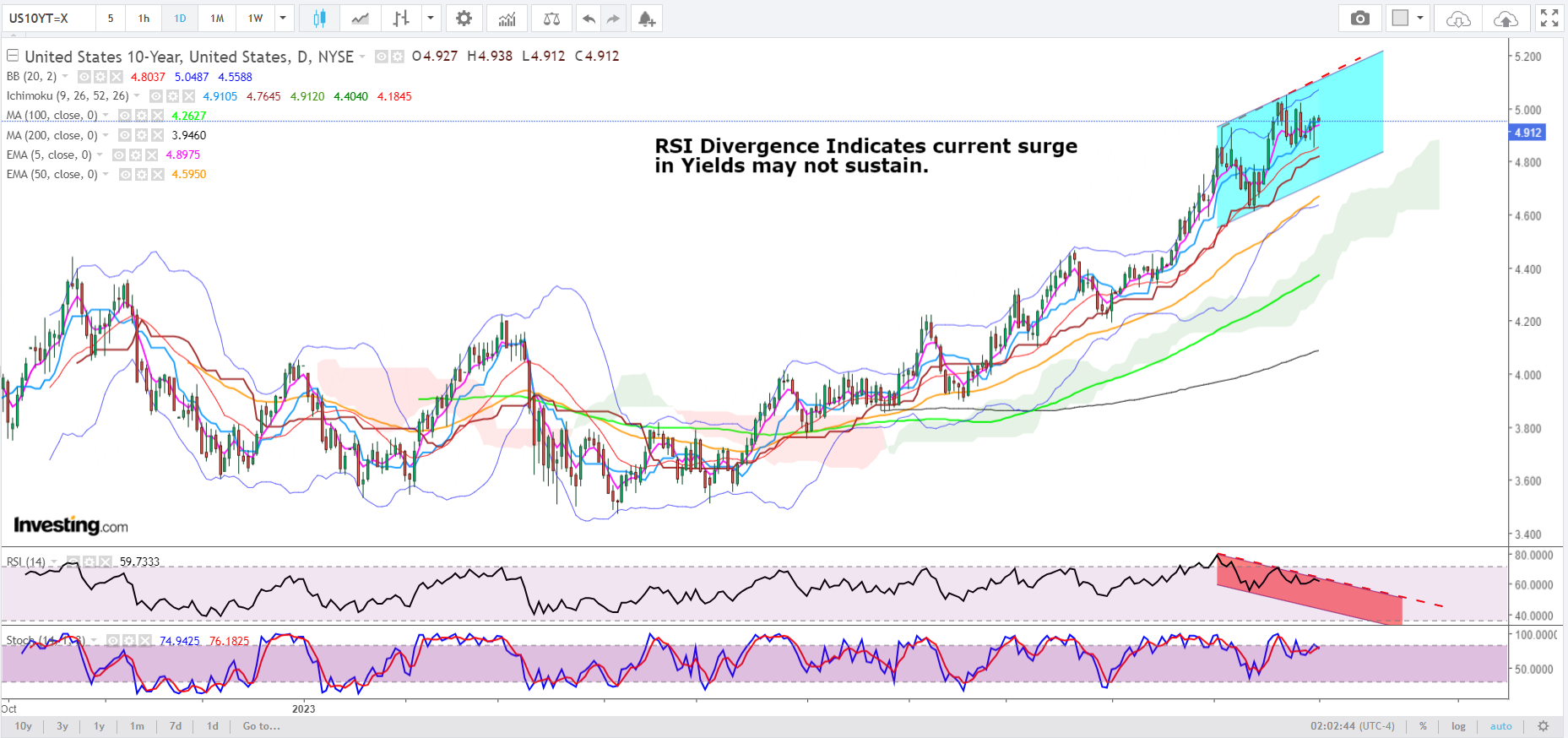- Gold is having a lustrous year with futures peaking above $2,000 in seven of past 10 months
- Currently, yellow metal is sitting in upper $1,900 range
- However, it could get dragged to $1,800 if yields surge
Gold longs are having their best year since the pandemic. In seven of the past 10 months, futures of the yellow metal have peaked above the cherished $2,000-an-ounce mark. Even the spot price of bullion, which holds itself to a more rigorous standard, has attained $2,000 glory four times, last in October, after an earlier three-month run between March and May.
Having benefited from a bunch of drivers, from global recession fears to the ongoing Israel-Hamas war which have made it a choice haven for many, both the futures and spot price are firmly ensconced in upper $1,900 territory now. With just over 60 days left for the year’s close, gold’s fairytale run could be threatened by an old nemesis: US yields. 
All charts by SKCharting.com, with data powered by Investing.com
Rally in Yields: Both Boon and Bane For Gold
The jaw-dropping selloff in US bonds — that has sent the yield on the benchmark 10-year Treasury note to 2007 highs of above 5% — has been both a boon and bane for gold.
On one end, the run-up yields has created such a high imbalance between the United States and the rest of the world that the resultant concerns of a global — if not at least, European — recession have sent risk-averse investors flocking to gold.
Those same investors sometimes see non-yielding gold as an asset to stay away from amid rising US federal deficits and the Federal Reserve's guidance that it will keep rates high until it is convinced that inflation is under control.
The Fed has another rate decision later today where it is not expected to make any change.
Notwithstanding that, the landscape for all asset valuations is deteriorating as the sell-off in Treasuries weighs across asset classes and increases borrowing costs for companies and consumers alike.
The Fed, in trying to strike a balance between rates and yields, may ultimately be forced to hike rates one more time before the year ends at its December meeting, in a classic “tail wagging the dog” phenomenon — where the central bank moves at the behest of the market.
Rising rates raise the opportunity cost of investing in non-yielding assets, implying a negative outlook for precious metals.
What’s more, investors should be prepared for Treasury yields to reach 7% if the US economy skirts a widely anticipated recession that Europe might not, Ned Davis Research warned in a note carried by Reuters on Tuesday.
The last time yields were at 7% was in 1995.
All these suggest volatile moves across markets that may cause gold to give up its $1,900 anchor and return to the more manageable $1,800 levels. This means it could end the year closer to flat rather than the near 9% annual gain it shows now.
Craig Erlam, analyst at online trading platform OANDA, warned on Tuesday:
“While gold is making brief moves above this major psychological level ($1,900), it's failing to get any traction at this moment.”
“That further reinforces how big a resistance level this is and if it can make a significant move above, it could accelerate as a result.”
Needless to say, the opposite could apply as well.
Technical Outlook: Spot Gold / US Yields
Sunil Kumar Dixit, chief technical strategist at SKChart and Investing.com’s regular collaborator on commodities charting, concurred that the $2,010 resistance has stopped the gold rally dead in its tracks.
He adds:
“Yesterday's close below the first line of defense at the 5-Day EMA, or Exponential Moving Average, of $1,986 opens the way for a further correction in spot gold.
As of now, the 4-hour intraday chart suggests sideways consolidation and the 50-EMA of $1977 acts as support, while the 5-EMA of $1983 serves as immediate resistance.
If the 50-EMA support of $1,977 is defeated, the decline could extend to $1,967 — a level which corresponds to the 23.6% Fibonacci retracement of the major previous wave in spot gold that took it from $1,810-$2,010.
Below this zone, the next leg lower would align with 38.2% Fibonacci retracement at $1933. If bearish reversal has to come true, bears have to ensure gold doesn't clear through $1983-$1993 and aim for $1,933.”
But all's not lost for gold bulls, as a stay above $1977 could still propel it towards $1,983, Dixit said.
“If buyers join in, the recovery may extend to the next resistance where the Middle Bollinger Band of $1,992 could be a turning point.
If recovery is established above $1,993, we may look for spot gold re-entering the bullish channel and resuming an uptrend that reaches $2,015-$2,035 initially.”

As for 10-year Treasuries, the Relative Strength Index, or RSI, divergence spotted on the daily chart stands in disagreement with the current surge in yield values, says Dixit.
A day/week close below 4.76% - 4.64% will ease yields to a shift between 4.59 and 4.29.
***
Disclaimer: The aim of this article is purely to inform and does not in any way represent an inducement or recommendation to buy or sell any commodity or its related securities. The author Barani Krishnan does not hold a position in the commodities and securities he writes about. He typically uses a range of views outside his own to bring diversity to his analysis of any market. For neutrality, he sometimes presents contrarian views and market variables.
